Kurt Gänzl
Encyclopedia of the Musical Theatre
2 January, 2024
Hugo Wittmann and Julius Bauer based their libretto on Les Deux Anglais by P-F Merville, Carl Millöcker wrote the music. Their show, Der arme Jonathan (“Poor Jonathan”) premiered at the Theater an der Wien, Vienna, on 4 January 1890.
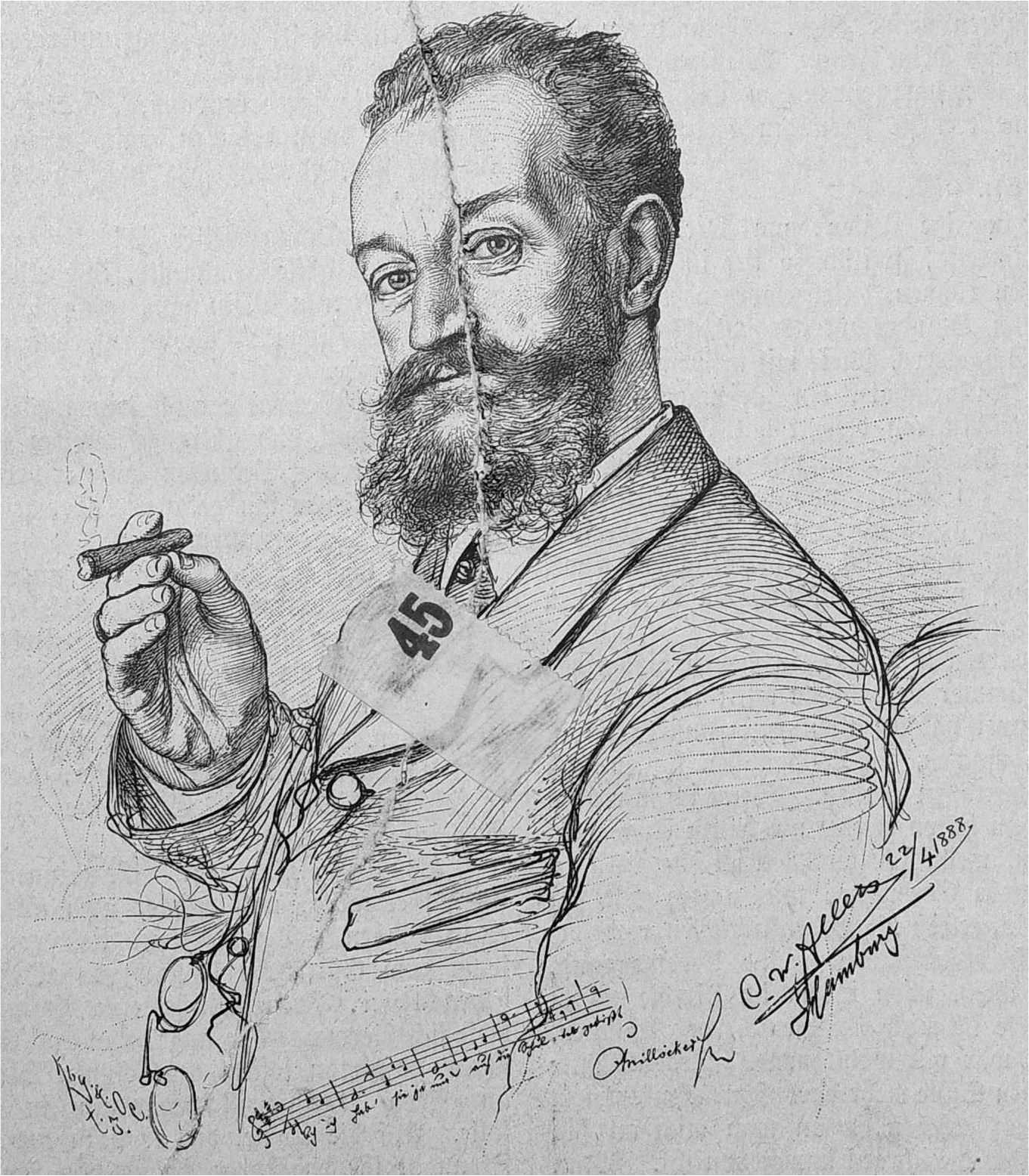
Composer Carl Millöcker.
The most successful Operette of the latter part of Carl Millöcker’s career, Der arme Jonathan was based by librettists Wittmann and Bauer on the French comedy Les Deux Anglais (Odéon, Paris 3 July 1817), an item in the Odéon repertoire for well over half a century, and supplied an outstanding rôle for Alexander Girardi, the star of the Theater an der Wien (and the rest of Vienna), as Jonathan, the comical little cook to eccentric Boston millionaire Vandergold (Rudolf del Zopp).
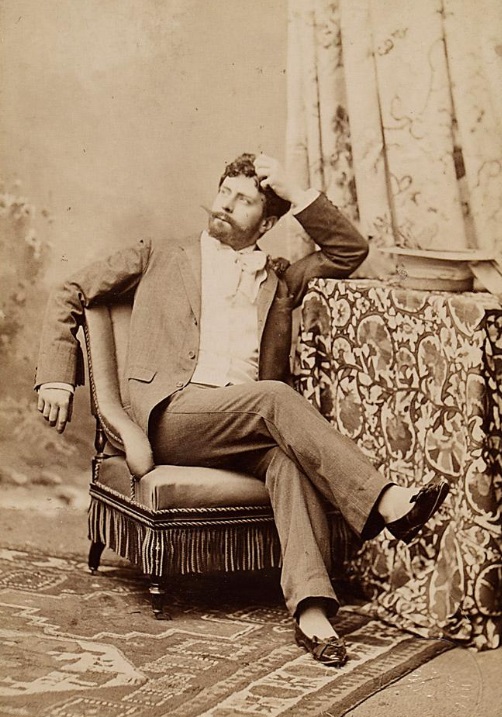
Rudolf del Zopp as Vandergold in Millöcker’s “Der arme Jonathan”. (Photo: Rudolf Krziwanek / Theatermuseum Wien)
The world-weary Vandergold decides to give away all his possessions and shoot himself, and at the same time the penniless and homeless little cook, whom he has sacked, embarks, for the very opposite reasons, on the same deadly plan. But, instead, the two come to an agreement. Vandergold ignores all his fawning friends and hangers-on and, making Jonathan the recipient of all his goods and chattels, he disappears.
The two have effectively changed places, but they have a pact that should it not work out they will get together again, with their revolvers, and finish what they almost started. They agree on a musical signal for the eventuality. Jonathan and his Molly (Therese Biedermann) go off to lead the high life in Monte Carlo and there they meet Harriet (Ottilie Collin), the little medical student whom Vandergold cherished, now a famous singer under the management of the perky Tobias Quickly (Sebastian Stelzer).
Harriet is not really happy, any more than Jonathan and Molly are, whilst Vandergold, who stayed alive only in the hope of winning Harriet, now thinks she has fallen for Jonathan and, utterly miserable, decides to call in his plan. Fortunately, he cannot remember the piece of music, for in the end he gets both his Harriet and his fortune back, Jonathan being only too happy to get rid of the responsibilities of wealth and become a cook once more.
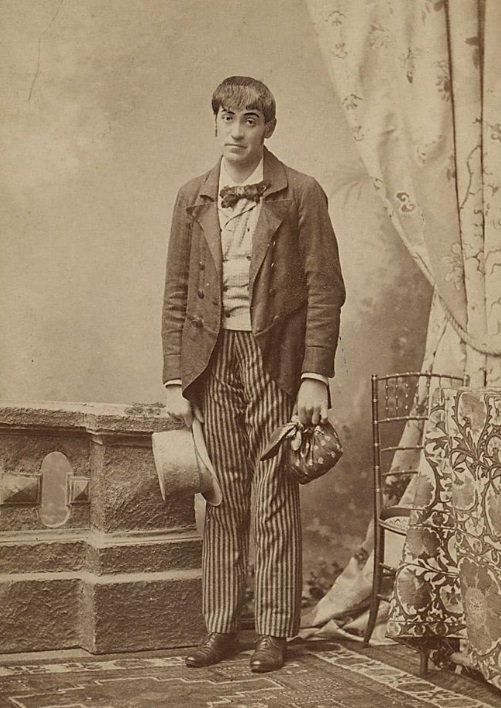
Alexander Girardi as Jonathan Tripp in Millöcker’s “Der arme Jonathan” at Theater an der Wien. (Photo: Rudolf Krziwanek / Theatermuseum Wien)
Millöcker’s score was unfailingly tuneful in both solo and in ensemble, its hits coming with the jaunty and plotworthy ‘Willst du mein Liebster sein?’, introduced by Harriet in the first act and repeated at the end of the third, and even more notably with Girardi’s obligatory waltz, ‘Ich bin der arme Jonathan’, sung by the star as his entrance in the first act and again as a closer.
Harriet, the prima donna, skittered through pages of coloratura on the top lines of the ensembles and finales, but the score of Der arme Jonathan was based firmly on the comical.
The second act gave the soubrette her chance in a lively song (‘Wir reisen im ganzen Italien’) and in a showy duet, with orchestral imitations, with Jonathan (‘Der Mann in allen guten Ehen’), whilst the comedian playing Tobias had two numbers, and the tenor Vandergold, returning from his heartbroken wanderings in the last act, had a jolly, marked sailor song.
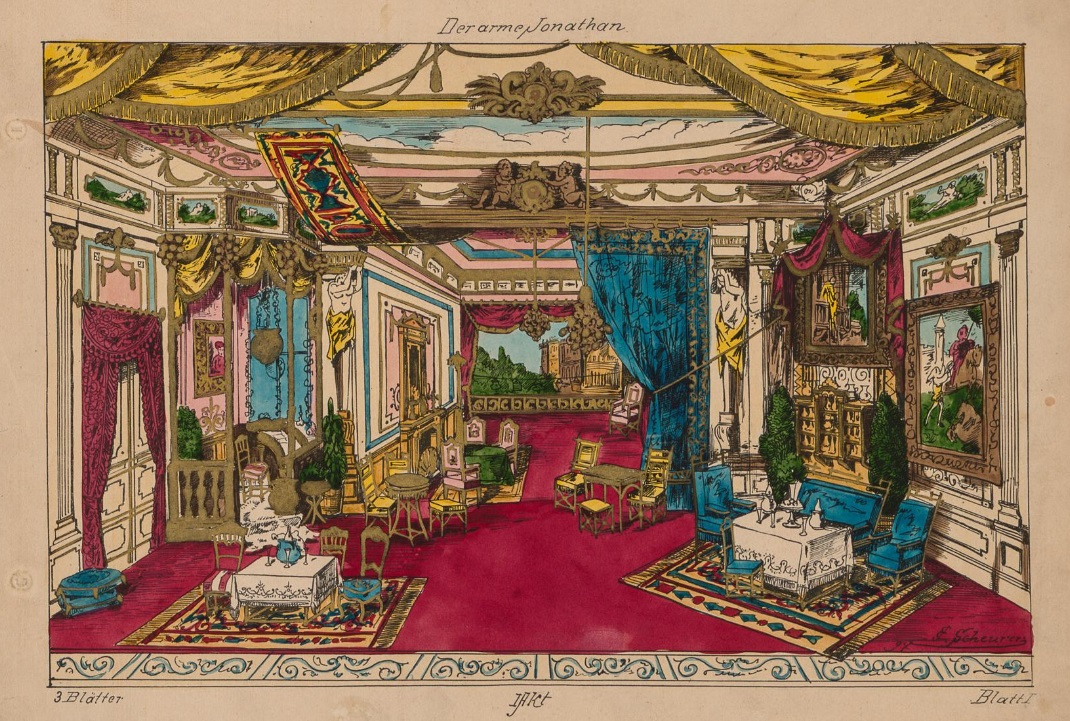
Set design by J. E. Scheurer for act 1 of “Der arme Jonathan”, 1897. (Photo: Theatermuseum Wien)
Der arme Jonathan was an unequivocal success. It was played 54 times consecutively under Alexandrine von Schönerer’s management at the Theater an der Wien, and it was repeated, over the next year or so, more than 50 further times. It passed its hundredth performance 2 April 1891 with Girardi now paired with Ilka Pálmay (Molly), and remained in the theatre’s repertoire until 1896.
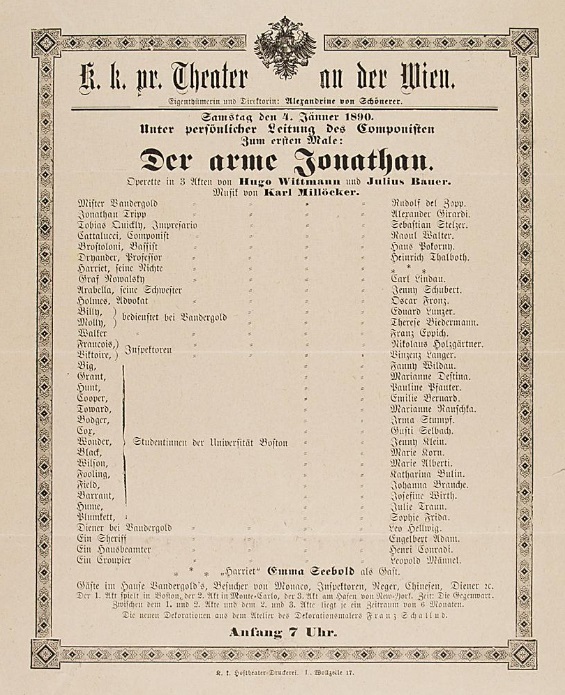
The cast list for the world premiere of Millöcker’s “Der arme Jonathan” at Theater an der Wien. (Photo: Theatermuseum Wien)
Within a fortnight of its première the piece was on stage in Berlin, and within two months Budapest’s Népszinház opened its version (ad Béla J Fái, Ferenc Rajna) featuring Pál Vidor (Jonathan), Aranka Hegyi (Harriet) and the queen of the Budapest stage, Lujza Blaha, as Molly, and made an enormous success. Der arme Jonathan was played throughout Central Europe (Zagreb, Prague, Basel, Bucharest etc), in Scandinavia and Russia (28 March 1890) all within months of the first performance, and America saw its first Poor Jonathan (ad by John P Jackson, Ralph A Weil) in October the same year.
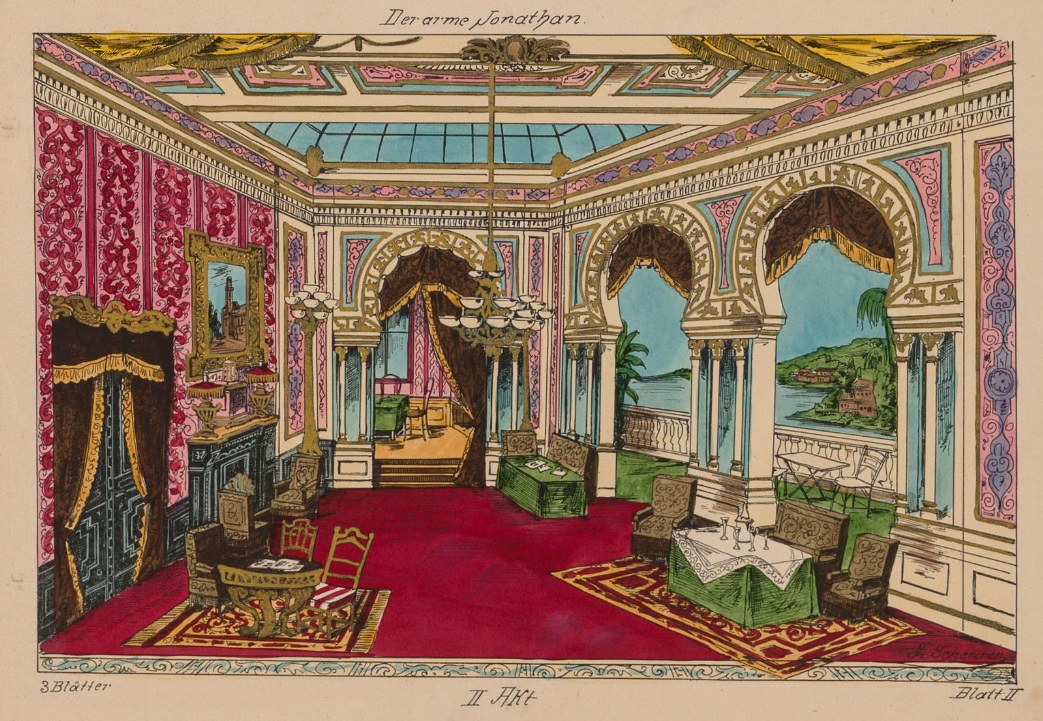
Set design by J. E. Scheurer for act 2 of “Der arme Jonathan”, 1897. (Photo: Theatermuseum Wien)
Produced by Rudolf Aronson and John McCaull at the Casino Theater, with Jeff de Angelis (Jonathan), Fanny Rice (Molly), Harry MacDonough (Rubygold), Edwin Stevens (Tobias) and Lillian Russell (Harriet) starring, it proved the biggest success that theatre had had in a number of years, playing seven months and 208 performances on Broadway before heading for the road. In the meanwhile, the original German version had also come on display at New York’s Amberg Theater with Josef Brakl (Jonathan), Paula Loewe (Molly), Adolf Philipp (Vandergold) and Emma Seebold (Harriet) starred, and it too proved a favourite. The German version was repeated at the Irving Place Theater in 1909 (21 October) with Hans Dobers as Jonathan and Hedwig Richard as Molly and an interpolated German coon song sung in blackface.
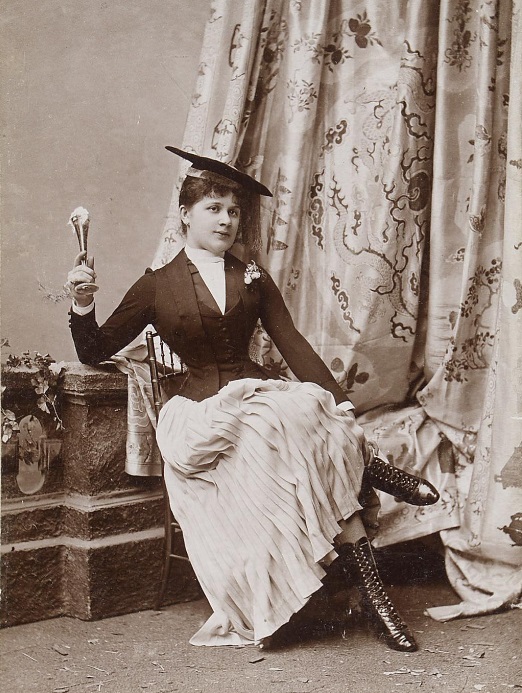
Pauline Pfauter in “Der arme Jonathan”. (Photo: Atelier Rudolf Krziwanek / Theatermuseum Wien)
Australia saw Poor Jonathan the following year, when Clara Merivale’s company introduced it in Melbourne with the manageress playing Harriet to the Jonathan of Jack Leumane, the Vandergold of W H Woodfield and the Molly of Ida Osborne. Britain, however, ignored the piece until well after the American success and, when Horace Sedger staged a version at the Prince of Wales Theatre in 1893, he had a new libretto written (ad C H E Brookfield, Harry Greenbank) which situated the piece in Britain, busied itself mainly with topical jokes, and cut some of Millöcker’s music, replacing it with extra numbers by a young composer currently trying to break in to the West End musical scene, Isaac Albéniz. Harry Monkhouse, Annie Schuberth and the Savoy’s Jessie Bond starred in this botched version which was a palpable and salutory failure.
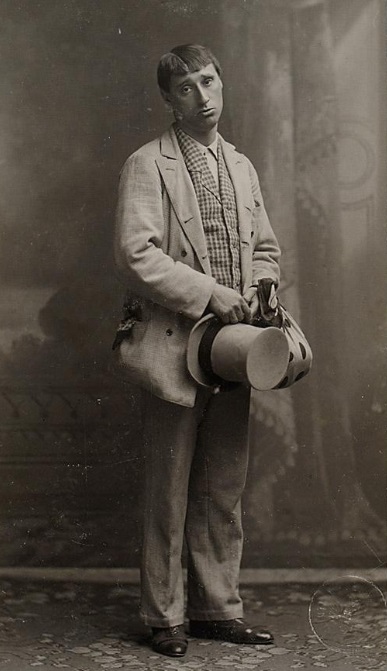
Louis Treumann as Jonathan Tripp in 1909. (Photo: Ludwig Gutmann / Theatermuseum Wien)
Der arme Jonathan had its first significant Vienna revival at the Johann Strauss-Theater in September 1910, with Louis Treumann as Jonathan and Mizzi Freihardt as Molly (35 performances), it was given a purposeful Nazi working-over by Heinz Hentschke and Gunther Schwenn for a 1939 revival at Berlin’s Admiralspalast (add mus Josef Rixner), and was played both in the repertoire at the Volksoper in 1952 and, in yet another reworking, at Munich’s Theater am Gärtnerplatz in 1959. Latterly, however, with the comedy musical falling out of fashion in favour of the romantic and the spectacular, it has slipped from the schedules.
A film version was produced by UFA Films with Lizzi Waldmüller and Rudi Godden featured.
Germany: Friedrich-Wilhelmstädtisches Theater 16 January 1890; Hungary: Népszinház Szegény Jonathan 14 March 1890; USA: Casino Theater Poor Jonathan 14 October 1890, Amberg Theater (Ger) 2 January 1891; Australia: Opera House, Melbourne Poor Jonathan 4 June 1891; UK: Prince of Wales Theatre Poor Jonathan 15 June 1893; Film: UFA
